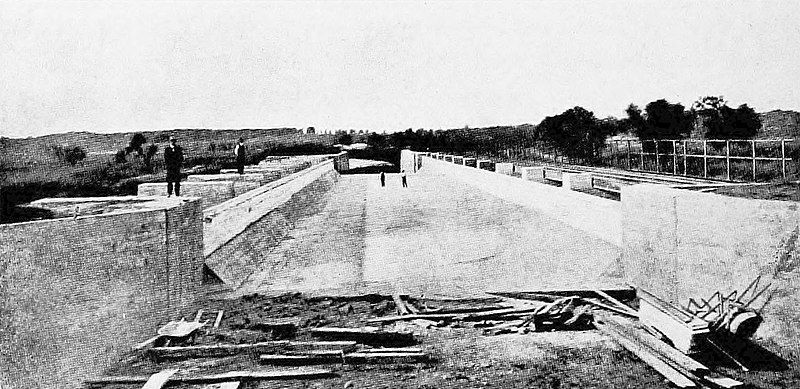English: Hennepin Canal.
Identifier: cu31924004640995
Title: The American transportation problem; a study of American transportation conditions, with a view to ascertaining what policy Americans should adopt in order to effectively meet existing conditions and be prepared to continue to lead the nations in the march of progress and civilization
Year: 1909 (1900s)
Authors: Peyton, John Howe
Subjects: Transportation Inland navigation Railroads
Publisher: Louisville, Ky., Courier-Journal Job Printing Company
Contributing Library: Cornell University Library
Digitizing Sponsor: MSN
View Book Page: Book Viewer
About This Book: Catalog Entry
View All Images: All Images From Book
Click here to view book online to see this illustration in context in a browseable online version of this book.
Text Appearing Before Image:
7 tons of freight—this in spite of a tremendous (manyfold) increase in population and wealth throughout the territory bordering on the lakes; and in spite of the fact that toll rates, through the canal, which were twenty cents per ton in 1884, were reduced until, in 1903, all toll charges were abolished. Traffic on all other canals and rivers of less than 155 twenty-foot depth, in the United States has, when exposed to competition with better and more modern transportation facilities, diminished to insignificant proportions, or been wholly abandoned, except under such conditions as are mentioned on page 155. The millions of dollars that were expended upon them have produced only monuments to human shortsightedness—of no more practical use than the Egyptian pyramids, but much more unsightly. The Hennepin Canal, seven feet deep and eighty feet wide, recently completed, between Rock Island, on the Mississippi River, and Hennepin, on the Illinois River, seems to be a monument to something
Text Appearing After Image:
HENNEPIN CANAL, OR ILLINOIS AND MISSISSIPPI CANAL. LINING AQUEDUCT NO. 8 WITH CONCRETE. The canal is 80 feet wide, 7 feet deep, and was recently completed at a cost of $7,446,746. Worthless and must be abandoned. far worse than mere shortsightedness and stupidity. In a speech made before the House of Representatives, on January 31, 1907, Congressman Burton, Chairman of the Rivers and Harbors Committee (see Congressional Record, Volume 41, Part Three, 58th Congress, 2d session, pages 2030-2031), said of it: I remember that about sixteen years ago there was an agitation here for the Hennepin Canal—a canal across Illinois. There was just the same airy nonchalance and contempt for expert knowledge. It was stated that we ought to leave it to business men—a very vague, indefinite statement. What is a business man? There are many different qualities of business men. Is he a boomer, who wants money spent in his locality? There was some questioning of motives 156 and abuse of whoever stood in its w
Note About Images
Please note that these images are extracted from scanned page images that may have been digitally enhanced for readability - coloration and appearance of these illustrations may not perfectly resemble the original work. 


